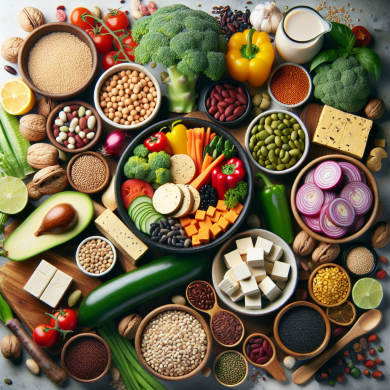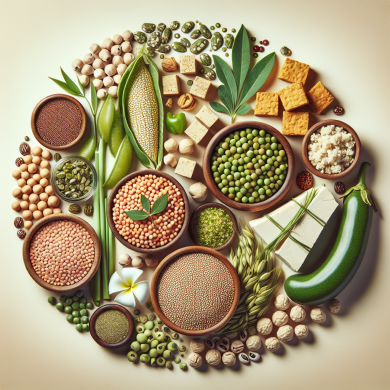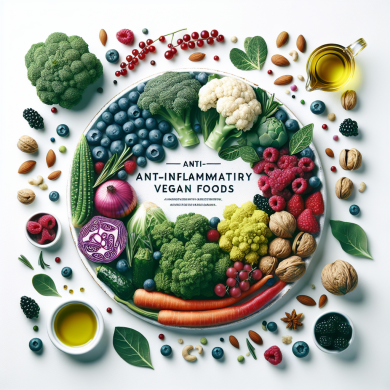Boost Heart Health with a Vegan Diet
Introduction
In recent years, the conversation surrounding heart health has become increasingly prominent, as cardiovascular diseases remain a leading cause of mortality worldwide. Diet plays a crucial role in maintaining heart health, and among the various dietary patterns, a vegan diet has emerged as a compelling option for those looking to boost cardiovascular wellness. This article delves into how a vegan diet can enhance heart health, supported by scientific evidence and practical tips for transitioning to a plant-based lifestyle.
Understanding Heart Health
The heart, a muscular organ responsible for pumping blood throughout the body, is central to our overall health. A healthy heart ensures efficient circulation, delivering oxygen and nutrients to tissues while removing carbon dioxide and waste products. The significance of heart health cannot be overstated, as poor cardiovascular function can lead to conditions such as hypertension, coronary artery disease, heart attacks, and strokes.
The Role of Diet in Heart Health
Dietary choices have a profound impact on heart health. Saturated fats, trans fats, cholesterol, and high sodium intake are known contributors to cardiovascular diseases. Conversely, diets rich in fiber, antioxidants, and healthy fats can promote heart health. A vegan diet, which excludes all animal products, naturally aligns with many heart-healthy dietary recommendations.
Benefits of a Vegan Diet for Heart Health
Lowering Cholesterol Levels
One of the significant benefits of a vegan diet is its potential to lower cholesterol levels. Animal products are primary sources of dietary cholesterol and saturated fats, which can elevate blood cholesterol levels. Elevated cholesterol, particularly low-density lipoprotein (LDL) cholesterol, is a known risk factor for atherosclerosis—a condition characterized by the buildup of fatty deposits in the arteries, leading to heart disease.
Plant-based foods, such as fruits, vegetables, whole grains, and legumes, contain no cholesterol and are typically low in saturated fats. Studies have shown that individuals following a vegan diet often have lower LDL cholesterol levels compared to those consuming animal products, thereby reducing the risk of heart disease.
Rich in Heart-Healthy Nutrients
A vegan diet is abundant in nutrients that support heart health. Fruits and vegetables are rich in antioxidants, such as vitamins C and E, which protect the heart by neutralizing harmful free radicals. Whole grains and legumes provide soluble fiber, which can help lower cholesterol levels and improve heart function.
Moreover, plant-based diets are high in potassium and magnesium, minerals associated with lower blood pressure. Lowering blood pressure reduces the strain on the heart and decreases the risk of developing hypertension and other cardiovascular conditions.
Promoting Weight Management
Maintaining a healthy weight is crucial for heart health, as obesity is a significant risk factor for cardiovascular diseases. Vegan diets, which tend to be lower in calories and higher in fiber, can facilitate weight management and reduce body mass index (BMI).
Fiber-rich foods promote satiety, helping individuals feel full longer and reducing overall calorie intake. By supporting weight loss and maintenance, a vegan diet indirectly contributes to heart health by alleviating stress on the cardiovascular system.
Reducing Inflammation
Chronic inflammation is a contributing factor to the development of atherosclerosis and other heart diseases. A vegan diet, rich in anti-inflammatory foods such as leafy greens, berries, and nuts, can help reduce inflammation in the body.
Additionally, plant-based diets often contain lower levels of arachidonic acid, a pro-inflammatory compound found in animal products. By minimizing inflammation, a vegan diet can support heart health and prevent the progression of cardiovascular conditions.
Transitioning to a Vegan Diet for Heart Health
Start Gradually
Transitioning to a vegan diet can seem daunting, but taking gradual steps can make the process more manageable. Begin by incorporating more plant-based meals into your diet and gradually reducing animal products. Start with Meatless Mondays or plant-based breakfasts to ease the transition.
Explore Plant-Based Protein Sources
Protein is an essential nutrient, and there are numerous plant-based sources available. Include a variety of legumes, such as lentils, chickpeas, and black beans, in your diet. Tofu, tempeh, and edamame are excellent sources of soy protein. Nuts and seeds, like almonds, chia seeds, and hemp seeds, also provide protein along with healthy fats.
Focus on Whole Foods
While processed vegan foods can be convenient, they may not always be heart-healthy. Focus on whole, unprocessed foods to maximize the benefits of a vegan diet. Prioritize fresh fruits, vegetables, whole grains, and legumes, and limit the intake of refined grains and sugary snacks.
Supplement Wisely
A well-planned vegan diet can provide most of the nutrients needed for heart health. However, certain nutrients, such as vitamin B12, vitamin D, and omega-3 fatty acids, may require supplementation. Consult with a healthcare professional or registered dietitian to determine the appropriate supplements for your needs.
Stay Informed and Inspired
Educate yourself about the benefits of a vegan diet for heart health and seek inspiration from cookbooks, blogs, and social media. Connecting with others who follow a vegan lifestyle can provide support and motivation on your journey to better heart health.
Conclusion
A vegan diet offers numerous benefits for heart health, from lowering cholesterol levels to reducing inflammation. By embracing a plant-based lifestyle, individuals can significantly improve their cardiovascular well-being and reduce the risk of heart disease. Transitioning to a vegan diet is a powerful step towards a healthier heart and a longer, more vibrant life. With careful planning and a focus on whole, nutrient-dense foods, a vegan diet can be both satisfying and heart-healthy.















Add comment